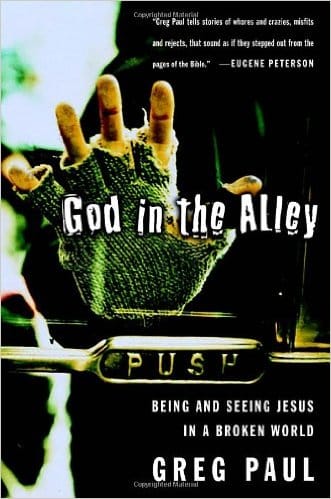God in the Alley


A friend of mine reluctantly read this book, thinking it would make him feel guilty. I suppose a lot of us approach a book like this with mixed feelings, hoping to be challenged but scared of where that might take us.
The book is called God in the Alley, and the subtitle says a lot: it’s about “being and seeing Jesus in a broken world.” For those of us who are sheltered, we are introduced to unfamiliar places and people, not far from home but far from our experience. I’m introduced to the underside of a park in Toronto that I’ve visited many times, and I learn where the high-priced working girls offer their services, and where the low-rent girls work. We meet crackheads, prostitutes, and victims of unimaginable abuse. And, surprisingly, we meet Jesus in the lives of these broken people.
“That’s what I want this book to be about: the cultivation of our ability to both be Jesus and to see Jesus,” writes Greg Paul, “if only by a dim flickering light – the afterimage on the darkened retina of a momentary, brilliant burst.” Those of us who think our lives are not all that bad might overestimate our abilities to be Jesus, but Paul challenges us: you can’t be Jesus if you aren’t truly seeing him.
If I truly want to be present as Jesus was and is, I must choose to act in very specific ways. Theory, or doctrinal correctness, is not enough. Seeing Jesus is a discipline of stillness. If I really want to see him, I’ll need to avoid being consumed by trying always to do things in his name, and I’ll need to learn to be motionless, intent on beholding what is in front of me.
Being present involves not only breaking through the comfort of middle-class life. It also involves breaking “beyond the internal barriers I have erected to protect myself.
So we read stories. These stories are not sanitized or romanticized. There is a lot of messiness in this book, and surprisingly, the messiness shows up in the good guys like Paul just as much as it does in the sinners. Even more surprising, we meet Jesus in surprising people: in those who are broken and who have little going for them. In one of the most moving stories, we meet a modern-day version of the story of Hosea and Gomer. Jesus shows up in the most surprising places, and if we’re not careful we’ll miss seeing him there.
Greg Paul teaches us to see Jesus in people rather than to see people as projects. He offers hope that we, too, may be able to develop the skill of seeing Jesus, just as he has, and ultimately in being Jesus to the people that we meet.
Paul reflects that at one point, if he had been asked how to be the presence of Jesus, he would have talked about being pure and strong and faithful. Although these are important, Paul explains today that he would answer differently.
I am more likely to have Jesus revealed to me and through me in weakness than in strength, sinfulness than in purity, or doubt than in perfect faithfulness….I come to this astonishing conclusion: Jesus is found in brokenness…
The surprise of this brokenness is not just that the Almighty allowed himself to be broken, and that he invites me to touch him there in that brokenness. It’s also that my own brokenness – that hidden, ugly, twisted stuff that I had expected would disqualify me forever from his friendship, and that, if it were known, would torpedo all my other relationships too – is precisely the place where he desires to touch me, and it is the place where I am most able to truly connect with other people.
I began this book expecting that it would teach me about how to serve those the middle class usually ignores. I finished realizing that it did much more than that: it introduced me to my own brokenness, with the “most attractive cover” we can find to hide the mess underneath, and it introduced me to the presence of Jesus in some of the people we see as being most broken. It gave me hope that I, too, can be and see the presence of Jesus in a broken world.
More from Amazon.com | Amazon.ca | Sanctuary Ministries





